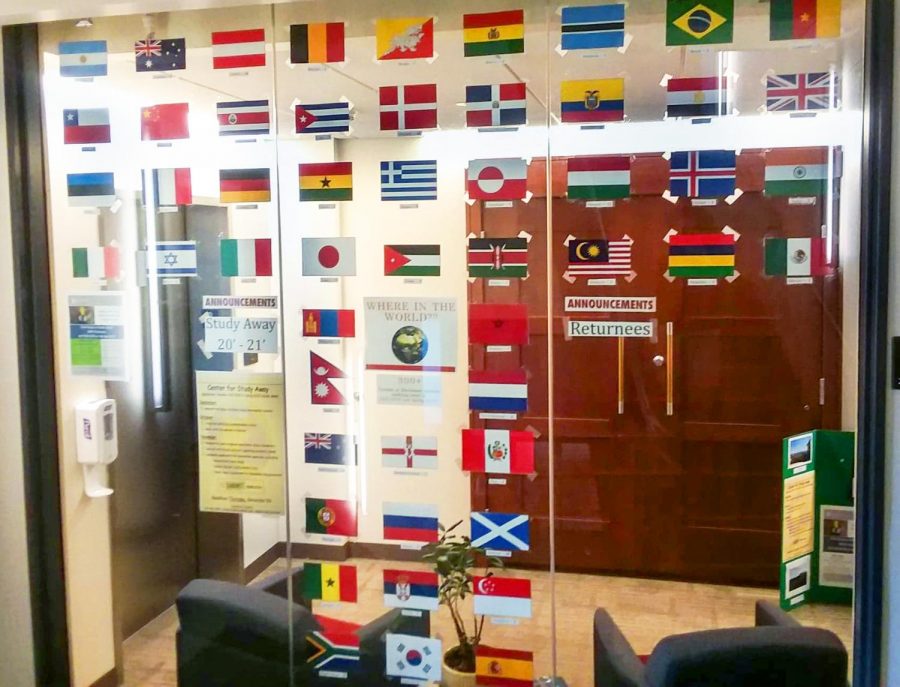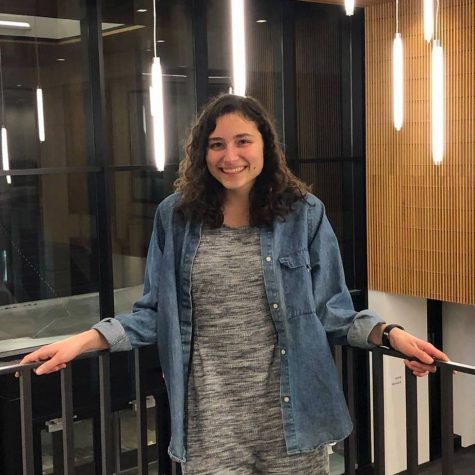Financial hurdles for international students studying away
The entrance to Center for Study Away displays flags of countries where students were abroad. Photo by Estelle Timar-Wilcox ’22.
September 26, 2019
Deadlines are on the horizon for students looking to study away in the 2020-2021 academic year. For the 60 percent of Macalester students who will study away, the fall semester means sifting through programs, financial aid options and recommendations from friends.
For Macalester’s international students, there are a few more obstacles.
International students can study away, but can only keep their financial aid if their major requires a semester abroad or if they are approved to study in a Group A program.
This challenge, which came up at the recent First Steps to Study Away presentations, surprised some international students.
When Diana Paz Garcia ’21 came to visit Macalester from her home in Mexico City, she was reassured that her financial aid package would follow her anywhere in the world — a rarity for international students.
“That really stood out to me,” Paz Garcia said.
Many international students show interest in studying away, according to Director of the Center for Study Away Kevin Morrison. International students attend the mandatory First Steps presentation at a similar (though slightly lower) rate compared to non-international students, but a lower proportion of international students end up applying.
“They do drop off at a fairly steep rate after they attend First Steps,” Morrison said.
The extra requirements for international students have been in place for decades, according to Assistant Vice President for Admissions and Financial Aid Brian Lindeman ’89. The policy existed in 2001 when he started working at Macalester.
Lindeman pointed to two reasons for this policy. The first: most study away programs cost the college.
“When students study away the college sends a check to the program provider,” Lindeman said. “If one expense goes up then another needs to come down, so it’s always this kind of balance of priorities.”
The second reason: international students are already abroad.
“The other part of this particular policy is the idea — and I know not everyone will agree with this idea — that international students who are studying at Macalester are already having an international experience,” Lindeman said.
Group A programs come at the lowest cost to the college. Whereas outside programs require Macalester to cover students’ expenses, the exchanges and Macalester faculty-led trips in the Group A category do not.
Paz Garcia, whose majors don’t require study away, was disappointed with her Group A options.
“I was really disappointed. I really tried to figure out a way,” Paz Garcia said.
Morrison said that the list of Group A programs can appear “deceptively small,” though the International Student Exchange Program does allow students to do an exchange with many universities around the world.
“When we added that program we felt that that really did expand the options for students who needed an exchange program option,” Morrison said.
Paz Garcia did eventually figure it out. She is currently completing an exchange in the Hague after several meetings and changes of plans.
Though she was initially accepted to a Group A program in the Hague, Paz Garcia had to change her plans when the program was cancelled after not enough students signed up. After working out a different plan to do an exchange, Paz Garcia struggled to get a visa as a non-American citizen. She got her visa late and missed orientation and the first week of classes.
Though she said the Center for Study Away was friendly and willing to meet with her throughout this process, they weren’t always very helpful.
“They clearly did not know how to manage the situation,” Paz Garcia said. “I’m sure I am not the first international student to study away, so it really was just a very frustrating process.”
Throughout the process, Paz Garcia struggled getting answers about why her financial aid situation was different from non-international students.
“It would be great if we had equal access or at least a reasoning, especially for a school that deems itself to be so multicultural,” Paz Garcia said. “Compared to other schools it does bring lots of privileges to international students and accommodations, but that part of having equal opportunity [for study away] would have been good.”
With some planning and adjustment, many international students are able to work out a way to go abroad. Cande Torres Jimenez ’22, who is hoping to study abroad next year, has found the process fairly smooth despite concerns about her financial situation.
“In the Financial Aid Office, they estimated the cost for me, they made a beautiful sheet to plan everything and they explained to me the financial aid they would be able to give me,” Torres Jimenez said. “In my case, I can keep most of my scholarship.”
As a graduate of the United World College system, Torres Jimenez receives a Davis scholarship, which all UWC graduates can get and use in any study away program.
“It’s just a matter of planning ahead,” Torres Jimenez said.
For many international students, though, studying away doesn’t work out.
“Lots of my peers that are international students, because of the process and because it was so frustrating and because it just seemed like it was going nowhere… eventually missed out on the opportunity,” Paz Garcia said.
“I always joke that being an international student at Mac is like, if you want to go from point A to point B, my American peers will just walk straight, and for me, I’ll have to climb a hill, fight a crocodile and land on my feet, and all while in heels,” Paz Garcia joked. “I eventually will get to point B, but it just takes lots more time and meetings and frustration.”
Morrison acknowledged these complications, especially since studying away requires a back-and-forth between the Financial Aid Office and the Center for Study Away.
“There are definitely some administrative hoops that need to be jumped through to make sure that students who are eligible actually are seen as eligible and receive the aid,” Morrison said.
Though studying away as an international student poses some challenges, Morrison emphasized that it is possible.
“Within the bounds of the policy as it’s currently established, we want to make sure that students are aware of the options that are available to them,” Morrison said. “Unfortunately what happens sometimes is the word goes out that international students can’t study away, and that’s not the message we want to send out.”














